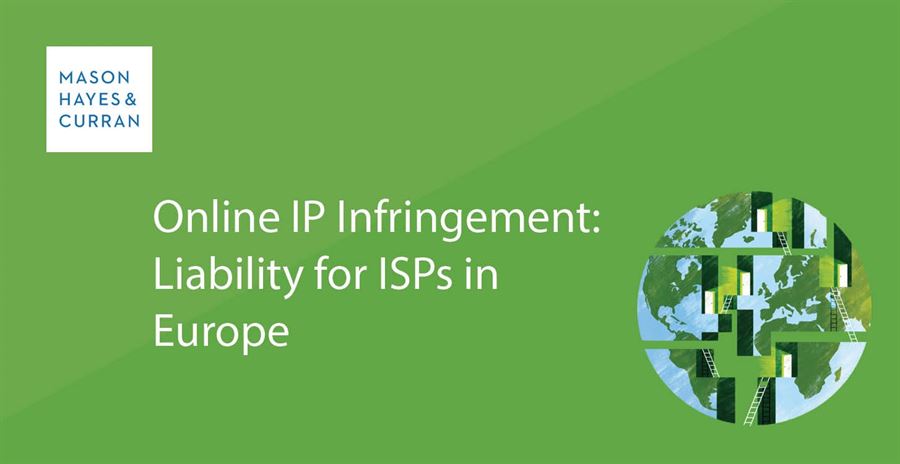
Intellectual property infringement has become increasingly common online and third party ISPs with deep pockets often find themselves involved in such disputes. We review the general approach of the CJEU to liability for intellectual property rights infringement for ISPs.
At the outset, it should be understood that there are two categories of ISP.
Host providers are ISPs which store the information of third parties on its servers, for example, filesharing and social networks. This category of ISP also covers web storage, web space and mail hosting.
On the other hand, access providers are ISP’s which provide the technical access to the internet or transmission of third party content. They include the likes of mobile and telephone suppliers, cable network operators and other telecommunication service providers.
Liability for Host Providers
Host Providers comprise of the following:
-
Internet Auction Platforms
If an internet auction platform has taken a neutral position (e.g. it has only processed data by automatic means), it will fall under the scope of Article 14(1) of the E-Commerce Directive (the Hosting Defence) and may be exempt from liability. Article 14(1) does not apply to platforms which have played an active role, in other words having knowledge or control of the data stored. Importantly, the platform will be deemed to have played an active role when it promotes the sale of the offending content.
If a neutral position has been adopted by the platform but the platform should have realised that the offers for sale in question were unlawful the Hosting Defence may not be permitted. The standard to be applied here is that of a diligent economic operator.
-
Search Engines
The CJEU has provided guidance on the liability of ISPs and advertisers for the use of others' trademarks as advertising keywords:
-
Trademark owners can prevent others from using its trade mark as a keyword for goods or services identical with those for which the mark is registered. This will arise where the advertisement does not make it clear that the goods or services originate from someone other than the trade mark owners.
-
An ISP does not become liable for infringement merely because it stored such a keyword and used it to organise the display of advertisements. However, if an active role was played so as to give the ISP knowledge of, or control over, what the advertiser was doing liability may arise. Liability may also arise where the ISP has failed to act expeditiously against infringing activity following notification.
-
Social Networks
For social media platforms, there is no obligation for a host provider to monitor third party content on its platform generally. In addition, a fair balance must exist between the interests of intellectual property rights holders and the ISP in question.
Online platforms should also be aware that, under Article 17 of Directive (EU) 2019/790 on Copyright in the Digital Single Market, they will effectively be obliged to introduce upload filter systems to assess whether content infringes copyright before it is published on their platform. This provision must be transposed into Irish law by June 2021.
Filesharing Services
In the context of copyright infringement, the concept of communication to the public will require a two-step test. Firstly, there must be an assessment of whether an act of communication of a work occurred. Secondly, an assessment must be made as to whether this communication was directed towards the public. The mere provision of physical facilities will not constitute such communication to the public but a direct link between websites with infringing content and the technical device will. The integration of add-ons available on the internet into a multimedia player is one such example of allowing users to easily gain access to protected works, which will be considered a communication to the public.
Liability for Access Providers
This category will mainly include telecommunication services providers. National courts must have the ability to order access providers to take measures which aim to end intellectual property rights infringements and prevent further infringements also. However, the protection of intellectual property rights will not be entitled to absolute protection as there needs to be a fair balance between the rights of all the parties involved. In addition, an injunction which prohibits an ISP from granting its users access to a website which contains copyright infringing content will be consistent with EU law. This will arise even in circumstances where that injunction does not specify the measures which the access provider is required to take. Having said that, these measures may not unnecessarily deprive users of the ability to lawfully access the information. The access provider should also be able to avoid incurring coercive penalties for breach of the order by demonstrating that all reasonable measures have been taken.
It should also be remembered that any act by an access provider, where it has full knowledge of the relevant facts, which allows its users access to protected works is at risk of being deemed an “act of communication” under Article 3(1) of Directive 2001/29.
An ISP may be found to be liable for third party infringements of intellectual property rights if it does not remove the infringing content when this content has been drawn to its actual attention. An ISP will not be required to actively monitor all of the content which is posted by its users.
The CJEU has clarified that a blocking injunction, which blocks access by a user to certain websites, may be compatible with EU law, even when that injunction is not specific in nature.
For more information and expert guidance in all related matters, contact a member of our Commercial Disputes or Intellectual Property team.
The content of this article is provided for information purposes only and does not constitute legal or other advice.
Share this:




